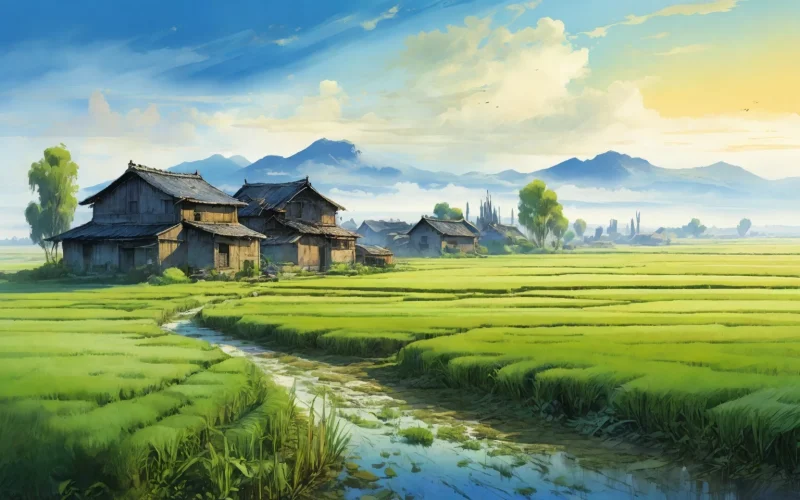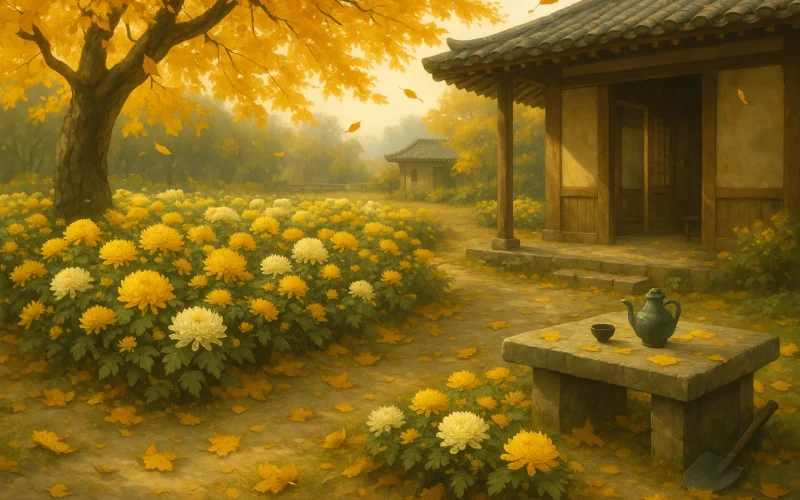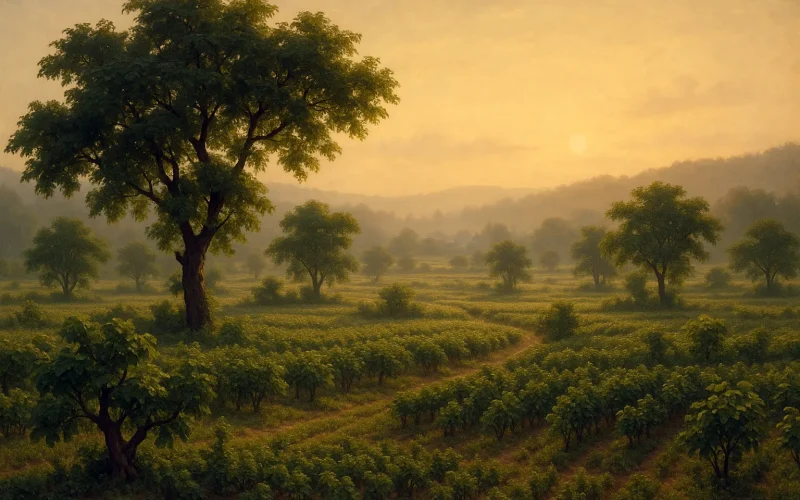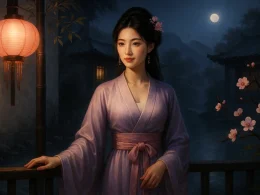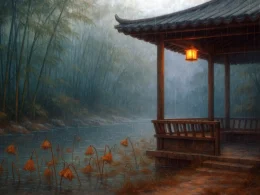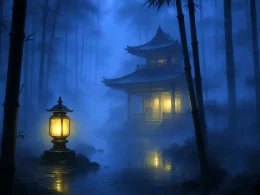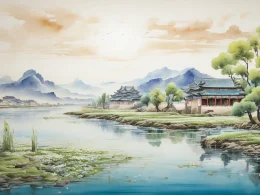While young, I was not used to worldly cares,
And hills became my natural compeers.
But by mistake I fell in mundane snares,
And was thus entangled for thirteen years.
A caged bird would long for wonted wood,
And fish in ponds for native pools would yearn.
Go back to till my southern field I would,
To live a rural life why not return?
My plot of ground is but ten acres square;
My thatched cottage has eight or nine rooms.
In front I have peach trees here and plums there;
Over back eaves willows and elms cast glooms.
A village can be seen in distant dark,
Where plumes of smoke rise and waft in the breeze.
In alley deep a dog is heard to bark,
And cocks crow as if over mulberry trees.
Into my courtyard no one should intrude,
Nor rob my private rooms of peace and leisure.
After long, long official servitude,
Again in nature I find homely pleasure.
Original Poem
「归园田居 · 其一」
陶渊明
少无适俗韵,性本爱丘山。
误落尘网中,一去三十年。
羁鸟恋旧林,池鱼思故渊。
开荒南野际,守拙归园田。
方宅十余亩,草屋八九间。
榆柳荫后檐,桃李罗堂前。
暧暧远人村,依依墟里烟。
狗吠深巷中,鸡鸣桑树颠。
户庭无尘杂,虚室有余闲。
久在樊笼里,复得返自然。
Interpretation
Composed in 405 CE after Tao Yuanming resigned as the Magistrate of Pengze, this work marks his official retirement to rural life. Weary from years of unfulfilling official service, he decisively returned to nature. "Returning to Dwell in Gardens and Fields I" serves as both a manifesto of reclusion and an authentic portrait of his idealized persona and aesthetic sensibility. Through unadorned language depicting pastoral scenes and serene solitude, the poem transitions from worldly disillusionment to bucolic yearning, expressing his liberation from bureaucratic constraints and pursuit of authentic freedom.
First Couplet: "少无适俗韵,性本爱丘山。"
Shǎo wú shì sú yùn, xìng běn ài qiū shān.
Youth spurned worldly graces; my nature cleaves to hills and streams.
The opening establishes Tao's innate antipathy toward social conformity and affinity for nature, foreshadowing his rural retreat.
Second Couplet: "误落尘网中,一去三十年。"
Wù luò chén wǎng zhōng, yī qù sānshí nián.
By mischance caught in dust-lit webs—thirty years lost to their snare.
"By mischance" underscores his involuntary political entrapment, with "thirty years" conveying accumulated exhaustion.
Third Couplet: "羁鸟恋旧林,池鱼思故渊。"
Jī niǎo liàn jiù lín, chí yú sī gù yuān.
A caged bird pines for its wood; pond fish yearn for their deeps.
Avian and piscine metaphors poignantly express his constrained official life and longing for natural freedom.
Fourth Couplet: "开荒南野际,守拙归园田。"
Kāi huāng nán yě jì, shǒu zhuō guī yuán tián.
Clearing wilderness southward, I guard my clumsiness in fields' return.
"Guard my clumsiness" epitomizes his conscious embrace of rustic simplicity over worldly sophistication.
Fifth Couplet: "方宅十余亩,草屋八九间。"
Fāng zhái shí yú mǔ, cǎo wū bā jiǔ jiān.
Ten-odd acres frame my home; eight or nine thatched huts stand plain.
The modest estate reflects contentment with essential comforts rather than material grandeur.
Sixth Couplet: "榆柳荫后檐,桃李罗堂前。"
Yú liǔ yīn hòu yán, táo lǐ luó táng qián.
Elms and willows shade rear eaves; peach and plum trees front my hall.
Orchard symmetry mirrors his harmony with nature's cycles and aesthetic order.
Seventh Couplet: "暧暧远人村,依依墟里烟。"
Ài ài yuǎn rén cūn, yī yī xū lǐ yān.
Dim-distant neighbor hamlets; curling smoke from hearths ascends.
The hazy middle-ground blends human presence with atmospheric tranquility.
Eighth Couplet: "狗吠深巷中,鸡鸣桑树颠。"
Gǒu fèi shēn xiàng zhōng, jī míng sāng shù diān.
Dogs bark in winding alleys; cocks crow atop mulberry boughs.
Auditory snapshots animate rural diurnal rhythms with visceral immediacy.
Ninth Couplet: "户庭无尘杂,虚室有余闲。"
Hù tíng wú chén zá, xū shì yǒu yú xián.
No worldly dust stains my gates; empty rooms breathe leisure deep.
"Empty rooms" symbolize both physical space and mental clarity achieved through simplification.
Tenth Couplet: "久在樊笼里,复得返自然。"
Jiǔ zài fán lóng lǐ, fù dé fǎn zì rán.
Long caged behind bars, now I regain nature's way.
The climactic couplet's "regain" pulses with hard-won joy, crystallizing his philosophical homecoming.
Holistic Appreciation
The poem's structure moves from biographical reflection to metaphorical self-portrayal ("caged bird"), then to vivid pastoral tableaux before culminating in spiritual epiphany. Tao's plainspoken diction fuses daily realities ("thatched huts," "mulberry crows") with transcendent yearning, achieving what critics call 平淡中见奇崛 (profundity within simplicity). The closing line's "nature's way" transcends physical return to signify ontological realignment with cosmic harmony.
Artistic Merits
Tao's genius lies in concreting abstract ideals through tangible imagery—birds/fish embodying constraint/freedom, smoke/dogs anchoring ethereal themes in sensory reality. Parallel couplets (e.g., "Elms shade rear eaves; peach trees front hall") create rhythmic cadence while mirroring nature's symmetries. Emotionally, the three-part progression—from bureaucratic disillusionment through rural immersion to philosophical resolution—models his 超然 (transcendent) worldview.
Insights
This poem redefines fulfillment: not through external achievement but internal congruence. Tao's "clumsiness" becomes a moral stance—a conscious rejection of performative sophistication to safeguard authenticity. For modern readers drowning in digital busyness, his "empty rooms breathing leisure" offer a radical template: true freedom begins when we stop mistaking cages for comfort. The work ultimately suggests that every soul's migration—whether to gardens or galaxies—seeks the same destination: a place where, as Tao writes, "no worldly dust stains my gates."
Poem translator
Xu Yuanchong (许渊冲)
About the poet

Tao Yuanming(陶渊明), 365 – 427 CE, was a poet, literary figure, fu writer, and essayist active during the late Eastern Jin and early Liu Song dynasties. Born in Chaisang (near present-day Jiujiang, Jiangxi Province), he pioneered a new genre of pastoral-themed literature, expressing profound philosophical insights through simple language. His poetic style became an enduring aesthetic standard in classical Chinese poetry.






